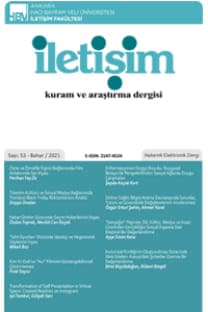Halkın Genetiği Değiştirilmiş Ürünlere/Üretilme Süreçlerine Yönelik Algıları ve Etik İnançları
Public Perceptions and Ethical Beliefs towards the Genetically Modified Products/Production Processes
___
- Bayoğlu, A.S. ve Özgen, Ö., (2010). Tüketicilerin tarımsal ve tıbbi biyoteknolojiye yönelik tutumları ile fayda ve risk algılarının incelenmesi, Uluslararası Sosyal Arastırmalar Dergisi, 3, (10), s. 90-103.
- Bredahl, L., (2001). Determinants of consumer attitudes and purchase intentions with regard to genetically modified foodsresults of a cross-national survey, Journal of Consumer Policy, 24, s. 2361.
- Frewer, L.J., Howard, C. and Shepherd, R., (1997). Public concerns in the United Kingdom about general and specific applications of genetic engineering: risk, benefit, and ethics. Scinece, Technology,&Human Values, 22, (1), s. 98-124.
- Frewer, L. J., Howard, C. ve Shepherd, R., (1998). Effective communation about genetic engineering and food. British Food Journal, 98, (4/5), s. 48-52.
- Gardner, G. E. ve Jones, M. G., (2011). Science instructors perceptions of the risks of biotechnology: Implications for science education. Research Science Education, 41, s. 711-738.
- Gaskell, G. Allum, N.,Bauer,M. W. ve Durant, J., (1999). Worlds apart? The reception of genetically modified foods in Europe and the US. Science, 16, s. 384-387.
- Kerlinger, F. N., (1973). Foundation of behavioral research. Second edition, Holt, Rinehart ve Watson, New York.
- Moerbeek, H. ve Casimir, G., (2005). Gender differences in consumers acceptance of genetically modified foods. International Journal of Consumer Studies, 29, s. 308- 318.
- Moon, W. and Balasubramaian, S. K., (2004). Public attitudes toward biotechnology: the mediating role of risk perceptions on the impact of trust, awareness, and outrage. Review of Agricultural Economics, 26, s. 186-208.
- Prakash, D., Verma,S., Bhatia, R. ve Tiwary, B. N., (2011). Risks and precautions of genetically modified organisms. International Scholarly Research Network, ISRN Ecology, Vol 2011, Article ID 369573, 13 pages.
- Savadori, L., Savio, S., Nicotra, E., Rumiati, R., Finucane, M. ve Slovic, P., (2004). Expert and public perception of risk from biotechnology. Risk Analysis, 24, s. 1289- 1299.
- Siegrist, M., (1998). Beliefs in gene technology: the influence of environmental attitudes and gender. Personality and Individual Differences, 24: 861-866.
- Siegrist, M., (2000). The influence of trust and perceptions of risks and benefits on the acceptance of gene technology. Risk Analysis, 20, (2), s. 195-203.
- Sparks. P., Shepherd. R., ve Frewer, L. J., (1995). Assessing and structuring attitudes toward the use of gene technology in food production: The role of perceived ethical obligation. Basic and Applied Social Psychology, 16, s. 267-285.
- Tabachnick, B. G and Fidell, L. S., (1989). Using multivariate statistics, Harper Collins Publishing, USA.
- Taş, A.S. ve Özgen, Ö., (2007). Tüketicilerin biyoteknolojide kullanılan organizmanın tipine yönelik tutumları ile etik sorumlulukları arasındaki ilişkinin incelenmesi, 6. Ankara Biyoteknoloji Günleri: Biyoteknoloji, Biyogüvenlik ve Sosyo- ekonomik Yaklasımlar, 15-17 Kasım 2007, Ankara, 223-236.
- Yayın Aralığı: 3
- Başlangıç: 1983
- Yayıncı: Ankara Hacı Bayram Veli Üniversitesi İletişim Fakültesi
Ajans Gazeteciliği ve Medya Sektöründe Haber Ajanslarının Etkinliği
Türkiye'deki İnternet Gazetelerinde Kullanıcı Katılımının İşleyişi ve Sınırlılıkları
Görsel-İşitsel Medya Özgürlüğü Uluslar Arası Düzenlemeleri
Tüketim Mekanlarının Dönüşümünde Görsel İletişimin Rolü: Küresel Kahve Dükkanları
Zaliha İnci KARABACAK, Özlen ÖZGEN
Hâkim Tasarım ve Ekşi Sözlük: İnternet'in Dönüşümünü Anlamak
Basın Dili Üzerine Bazı Dikkatler
Halkın Genetiği Değiştirilmiş Ürünlere/Üretilme Süreçlerine Yönelik Algıları ve Etik İnançları
Ayşe Sezen SERPEN, Haluk EMIROĞLU, Berk BENLIOĞLU, Özlen ÖZGEN
